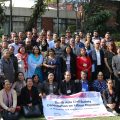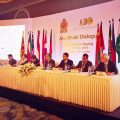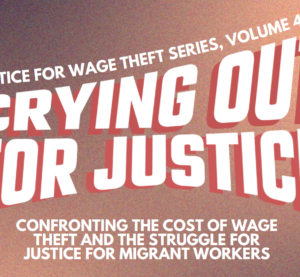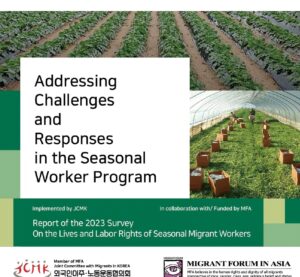Civil Society Statement to Colombo Process Governments
— November 22, 20165th Colombo Process Ministerial Meeting | 24-25 August 2016, Colombo, Sri Lanka
We, the migrant civil society, welcome the invitation of the Sri Lankan government in this year’s Colombo Process Ministerial meeting. Looking back in 2011 and 2014, civil society also had the opportunity to be part of this process albeit with limited spaces.
Thus, we reiterate our call for a meaningful participation of migrants and civil society in formulating and implementing rights-based and gender-sensitive policies and programmes and services for migrants.
Download the full statement here.
In view of the five thematic areas that you will discuss in this 5th CP Ministerial Meeting, may we bring to your attention and for your kind consideration the following concerns and recommendations
1. Qualification and skills recognition process
To address the lack of commonly agreed framework or standard for recognising skills acquisition across countries, we recommend the adoption of the ILO Regional Competency Standards to prevent mismatch or deskilling of migrants. We also propose the the skills acquired by migrants in receiving countries are duly recognized and accredited which is necessary for the advancement of their careers. With respect to returnee migrants, CP should harness theirexpertise to ensure productive and sustainable reintegration. To realize these, we propose the following:
- Employers to provide skill certification at the end of the contract e.g. type of skills and duration of experience
- Awareness programmes on existing skills and qualifications programmes
- Develop a database of migrants including returnees and their corresponding skills and qualifications.
- Coherence in wage payments for all migrant workers including skills enhancement, promotions and other incentives
2. Ethical labour recruitment practices:
We recognize governments’ efforts in addressing the systemic malpractices that happen within the recruitment process. Despite efforts to reform this industry, migrant workers continue to be exploited and many stories of abuses have been recorded in the past 5 years. We reiterate our call to effectively implement existing recruitment regulations and enforcement of stiffer penalties as well as administration of online recruitment system to ensure that recruitment agencies and employers do not bypass the system. Specifically, we recommend CP governments to:
- Ratify and implement the ILO Convention 181- Private Employment Agencies Convention-1997 and progressively implement zero recruitment fee and employer- pay recruitment model.
- Regulate sub-agents and establish accountability.
- Anti-illegal recruitment and anti-trafficking measures need to be properly monitored and ensure that perpetrators are brought to jusctice and victims/ survivors are legally assisted and adequately compensated.
- Establish independent tri-partite commissions to investigate illegal recruitment practices.
- Ensure civil society representation in the Thematic Working Group that the CP will set up.
3. Effective pre-departure orientation and empowerment
We welcome the development of a Comprehensive Information and Orientation Programme (CIOP). We recommend that its implementation must be gender-sensitive and supported by enabling and supportive institutional and legal infrastructure that recognizes the human rights of migrants.
In addition, pre-departure orientation must include discussion on migrants’ rights and obligations, understanding enforceable and binding contracts, country‐specific information, redress mechanisms and available services onsite, responding to crisis situations and financial literacy and opportunities for reintegration. Further, methods of teaching and learning must also be improved . We recommend further the following:
- Decentralisation of migration process and information resource centers/desks across the country
- Enhance capacities of trainers in order to ensure quality training.
- Recognize the expertise of returning migrants, and mobilize them as resource persons in CIOP
- Develop comprehensive information and recruitment guidelines for each labour receiving countries, and,
- Civil society to be part of the TWG and in the implementation of the CIOP
4. Promote cheaper, faster and safer transfer of remittances
We share strongly this advocacy and that it should apply to all migrants regardless of their status in the receiving countries.
Moreover, may we put forward the following recommendations:
- Governments shall take measures to reduce transaction cost for remittances to less than 3% as per SDG recommendation.
- Regulation and monitoring of remittance charges at the country level.
- Set up a sex-disaggregated data base on remittance transactions.
- Establishment of online banking processes and global partnership between local banks in receiving countries that would make it easier for migrant workers to transfer remittances.
- Governments should encourage local banks to develop incentives and benefit packages for migrants and their families.
5. Enhance the capacity of CP Member States to track labour market trends
- Establish a Permanent Secretariat for the CP for better coordination and implementation of the CP recommendations.
- Monitor regional economic trends in relation to labour market demands
In addition, we recommend that governments take cognizant of the following pressing issues which warrant immediate attention:
Stranded migrant workers in Saudi Arabia and other parts of the Gulf region: The oil price fluctuation affected very badly the migrant workers in the GCC.Thousands of workers lost their jobs, and were denied of their wages and service benefits. Some companies deny workers of their benefits in exchange for the No Objection Certificate. While concerned governments have responded and provided immediate aid, responses are all but temporary. CP countries should take to task the GCC governments as well as the employers to ensure that the affected migrant workers are provided with proper compensation and redress. Any assistance and/or repatriation program should be grounded on human rights and with informed consent of migrants. CP countries should learn from the lessons of the past financial crisis that left many migrant workers displaced and stranded and without prospect for local employment for those who eventually opted to go back home.
All the more that it becomes very urgent for countries of origin to provide decent job opportunities at home so our workers will not be held hostage in situations like these.
Blatant attack on the dignity of migrant domestic workers: It is a common knowledge that advertisement of migrant domestic workers is widely practiced by recruitment agencies. Recently, a Bahraini recruitment agency sparked criticism for displaying three of its domestic workers like commodities for sale. This is not the first time that this happened.
We call on the CP countries to take measures to encourage receiving ntries to create a migrant-friendly social and legal environment where all migrants particularly domestic workers, are treated with dignity and respect.
Adoption of a standardized employment contract for migrant domestic workers that reflect the needs and interests of migrant women domestic workers: We recognise governments who have stepped up and forged bilateral labor agreements accompanied by a standard contract. These contracts should adequately address the needs of women migrant domestic workers, in terms of working hours, protection against abuse, harassment and violence, freedom of movement, the right to freedom of association and collective bargaining, monitoring the workplace conditions, and inclusion tosocial protection including maternity protection.We also reiterate that we should recognize domestic workers as workers per ILO C189 and consistenly use the term “domestic worker” to refer to them and reflect this in all documents including the employment contracts, and include them in the coverage of national labor and social laws.
Improve programs and services onsite; enhance cooperation of CP foreign missions. We commend some CP governments that have taken progressive steps towards providing assistance to migrant workers onsite. We also note however, that some still have ad hoc arrangements.
Governments need to allocate timely and adequate human and material resources for their programs for migrants at the foreign missions. Moreover, we urge stronger cooperation and coordination amongst CP foreign missions in labor receiving countries.
Careful examination of the recent reforms in policies and practices in labour receiving countries: In recent years, we have noted efforts by Gulf countries to reform the Kafala system. However, we note that these reforms contain conditions which still restrict migrants’ right to mobility. We therefore, call on CP governments to revisit these changes in the laws/policies to ensure that these are to the interests of the migrants.
Restrictive policies on women migrants: We note that CP governments always resort to restrictive policies such as age-ban, sector-specific ban and the like. While we understand governments intention to protect women migrants, existing reports say that these bans are not effective in reducing the vulnerability of women migrants. Oftentimes, these bans lead to clandestine migration which puts women migrants to further risks. We also note that these policies fail to recognize the agency of women. We therefore recommend that labor sending and labor receiving countries mutually agree on measures to ensure safe, legal, and informed migration for our women migrants including programs and policies that are rights-based and gender-sensitive.
Effectiveness of online complaints system: We recognize the efforts of some labor sending and labor receiving countries in establishing online portal systems to report labour rights violations. While we consider this an encouraging development, we note that these systems need to be further enhanced to make them more accessible to all migrants by simplyfing the form, and should be written in the language understood by migrants. Migrants’ access to communications must be ensured as well.
Rampant cross-border labour trafficking of migrants: We note the widespread cross-border trafficking of migrant workers in the Gulf who enter through visit visas. This system is abused by unscrupulous recruitment agencies and employers where migrants are either provided with fake job orders and/or documents or they are trafficked to another country. We recommend that CP governments look into this issue and take appropriate measures to stop it.
Genuine participation of civil society in CP meetings and related processes: We reiterate our strong recommendation that participation of civil society, trade unions and media in the CP processes be institutionalized and include in its Operating Modality.
As Sri Lanka hosts the next Abu Dhabi Dialogue (ADD), we hope that our recommendations merit immediate actions from CP Member States. The time is ripe that we come together on a common ground for the best interest of migrants and their families and ensure a meaningful e and constructive dialogue.
For more information, please contact:
William Gois
Regional Coordinator
+639209600916
mfa@mfasia.org







